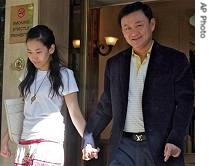2006年VOA标准英语-Ousted Thai PM Leaves Mixed Record as Governmen
搜索关注在线英语听力室公众号:tingroom,领取免费英语资料大礼包。
(单词翻译)
By Ron Corben
Bangkok
21 September 2006
 Thaksin Shinawatra leaves a London hotel with his daughter Pinthongta, September 21, 2006 |
||
-----
Thaksin Shinawatra, a former policeman and telecommunications tycoon6, was elected to office in 2001 by a landslide7. He often extolled8 the virtue9 of business management in his approach to government.
His chief executive officer style was applied10 from cabinet meetings to the local government level, where he called on governors to apply skill to delivering services to local communities.
It wasn't long after the Thai Rak Thai party that he founded won election, however, that Mr. Thaksin's critics were accusing him of arrogance11 and authoritarianism13. In an address in 2003, he answered his critics.
"Under a democratic system you have to make it clear, you have to make it strong and push it. This is not authoritarian12. Under a democratic system how can I be authoritarian? [But] If you try to make democracy, at the end you will run a country by playing politics everyday," he said.
At the time of Mr. Thaksin's first victory, the Thai economy, bruised14 by Asia's financial crisis of the late 1990s, was in need of a strong leader.
After the election, he quickly began implementing15 populist policies aimed at the poor, including subsidized public health programs, low-cost loans for the rural poor and village-based micro-industries.
His brusque manner made him unpopular among politicians, academics and the middle class in Bangkok, but his policies were extremely popular in the countryside. He easily won election again earlier this year, despite the allegations against him, and many of the people he helped have expressed dismay at his being thrown out of office.
Thitinand Pongsutthirak, a political scientist at Chulalongkorn University, has been critical of Mr. Thaksin. But he concedes that the prime minister did make positive contributions during his time in office.
"The focus on the rural poor, the rural grass roots, the urban poor - his restructuring of the bureaucracy was done when it was needed. So he left a very mixed legacy16. I would say 95 per cent is not good - but don't forget the five percent," said Pongsutthirak.
Street protests against Mr. Thaksin's policies began in Bangkok in late 2005, and evolved into outright17 calls for his resignation in January, after his family's tax free-sale of nearly $2-billion worth of stock in the company he founded.
Chulalalongkorn University's Thitinand said that act became a key factor leading to Thaksin's downfall.
"The reasons for the coup was Thaksin's lack of legitimacy18 stemming from the charges we've seen all throughout the year - constitutional violations19, corruption, conflict of interests, abuses of power, selling state assets to foreign companies," he continued. "These are charges that Thaksin has not answered."
But Thitinand believes Thaksin may yet attempt to make a return to Thai politics.
"Thaksin's support runs deep - it's extensive, it's widespread," added Thitinand. "And we have to admit that he's done something that no one else in Thailand has done - he has made himself very popular to a majority of the Thai people."
Mr. Thaksin was in New York for the United Nations General Assembly when the coup took place. He is now in London, where he released a statement Thursday calling for "national reconciliation," and urging all parties to work together for the sake of the Thai king and country.
It was a typically flamboyant20 gesture from a forceful politician who has not yet admitted that he has lost.




